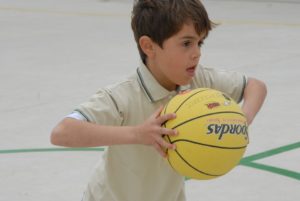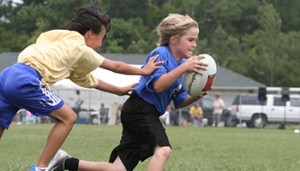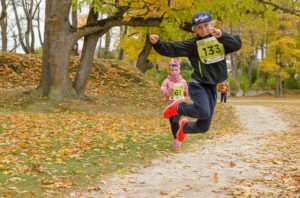Authored by Bethany Gurr & Emily McDonald, edited by Emily McDonald & Melanie Paterson, researched by Thomas Botfield, Pamela Fabbreschi & Katerina Kubienova, Team Leader: David Senior and Team Moderator: Christine White (E119 19J students)
This blog was written as part of a collaborative team work task by students studying E119. They had to select a topic and then decide on what roles each person would perform in the team, such as researcher, writer, editor and leader. This blog was chosen as one of the best blogs from around 80 blogs that were produced.
Ahhh Mrs Hampton, I won’t forget her. She was my Primary School Physical Education (PE) Teacher and she knew all 625 pupils’ names. We had PE twice a week, the whole year of girls and boys for roughly 45 mins each and I LOVED IT. My mother kept me active as a child, which is why I’m sure I’m not obese now (with the amount I ate!) and remain an active adult years later (yes – I still love my food!). My sister on the other hand despised PE. She was the child always forgot her PE kit, (it was always in the cloakroom) had a headache or felt ill… whereas I opted to wear my sports t-shirt daily, sporting trainers and shorts under my skirt. Everybody is different and has preferences, but Primary School age is where fundamental basics of health are cemented which lead on into adolescence and later adulthood.
Children love to be active, exploring their bodies and what they can do. As a parent of three young children, I’m curious where they get their energy from (perhaps they suck it from me). So, what makes children, like my sister, hate PE? What can teachers, schools and parents do to ensure children meet their daily recommendations of physical activity (PA) and enjoy it?
Luckily for me I was proficient at most sporting activities I attempted, blessed with a competitive nature, gifted with good reflexes and speed with massive determination to be able to do what the older kids could (persuaded my Mother to teach me to ride my bike without stabilisers when my sister did – I was only 3). Yet I understand what it must be like for children with poor reflexes, not-quite-there gross-motor skills, lack of co-ordination and lacking in self-confidence, because that child is my son. Why should I, as a parent, ensure he avails of all PE classes, if he’s not really that good? (Forgive me for telling the truth) … What are the benefits obtainable from PE in schools? Why should children do it?
Apart from health and well-being benefits, these hurdles he and many other children face, can be overcome. From strength, to balance, to hand-eye-co-ordination, bringing forth confidence with each accomplishment achieved. Proven to be beneficial to not only their physical health it encourages social, emotional and mental health development (Moray House School of Education and Sport, 2019) and is integral to future wellbeing.
Those team games were not in vain!
Further to this, research has shown PA induces chemical changes within the brain, encouraging new cells to form which in turn increases the size of the hippocampus, in simple terms the part of the brain that regulates emotion, learning and memory (Human Kinetics, n.d.). These changes are long-lasting, impacting how children think and behave socially, promoting learning which will not only compliment other areas of their education but will also see memory recall improvements.
Let’s explore some more…
The Department of Education recommends children receive as a minimum, 2 hours of PE per week and it is compulsory in the primary curriculum, BUT it is at the school’s discretion how much time they invest in it (Department of Education, n.d.). Luckily my children attend a school that adheres to these minimum requirements but what about quality? Unfortunately, Mrs H (whom I thought didn’t like children very much with her vigorous PE sessions) is no longer a PE teacher and like many other schools, there are no ‘PE teachers’, so who delivers them? The class teacher, yes, teachers are required to conduct their classes PE sessions and it’s reported that they receive on average as little as six hours training during their teacher training on how to deliver PE (Youth Sport Trust, 2018).
SIX HOURS!?!
Surely that cannot be enough to equip any person to undertake an hour-long session with 20 – 30 children?! While that may not be congruent within all schools and to each individual, it is a shocking number to see.
The Daily Mile
This sounds torturous to someone who isn’t fond of long distance because of their desire to get things done hastily, resulting in not-so-pleasant regurgitation at completion… (me – a sprinter). This initiative was introduced in 2012 (McIvor, 2018) and research shows that those who partake (walking or running) are significantly healthier than those who don’t. Schools are facilitating children’s ability to surpass the minimum 2 hours of PE in schools!
Some more figures for you…
A shocking 20% and 23% of 5-12-year-old girls and boys respectively, meet the recommended 60 minutes of activity per day and even more alarming is the fact that 1 in 5 children enter primary education overweight or obese! (Public Health England, 2017).
What’s going on?
To put it bluntly, children aren’t meeting their daily activity requirements and childhood obesity is AN ISSUE! Although children are receiving 2-hours PE in school per week, 5 hours are lacking and there’s no other way to say this but that it is on us.
So, should PE classes be compulsory in Primary school?
You have to agree PE is an absolute must. If it’s the only 2 hours of PA some children see a week, how can we contend its importance? Don’t we want our children to grow into young healthy active adults? Educating children on vital social skills, developing personal skills that will hold strong throughout their lives is vital. What is even more important is that parents promote healthy life choices, encourage activity, whether that be walking or cycling to school, family walks on a day out, or extra activities outside school hours like football, gymnastics or swimming.
What remains to be seen is how the Government and Schools implement guidelines. How they develop alternative approaches to how PA is delivered, to provide efficient, more enjoyable times spent in shorts, and ultimately encourage our youngsters to choose themselves to be active.
References
Department of Education. (n.d.). Retrieved from https://www.education-ni.gov.uk/articles/statutory-curriculum
Human Kinetics. (n.d.). How physical activity and exercise enhance children’s cognition. Retrieved from Human Kinetics Europe: https://uk.humankinetics.com/blogs/excerpts/how-physical-activity-and-exercise-enhance-childrens-cognition
McIvor, J. (2018, May 10). BBC News. Retrieved from BBC: https://www.bbc.co.uk/news/uk-scotland-44053387
Moray House School of Education and Sport. (2019, July 24th). The University of Edinburgh. Retrieved from https://www.ed.ac.uk/education/rke/centres-groups/pe-research/importance
Public Health England. (2017, July 17). Retrieved from https://www.gov.uk/government/news/number-of-children-getting-enough-physical-activity-drops-by-40
Youth Sport Trust. (2018, May 29). Retrieved from https://www.youthsporttrust.org/news/teachers-need-more-support-nurture-love-pe-and-school-sport




